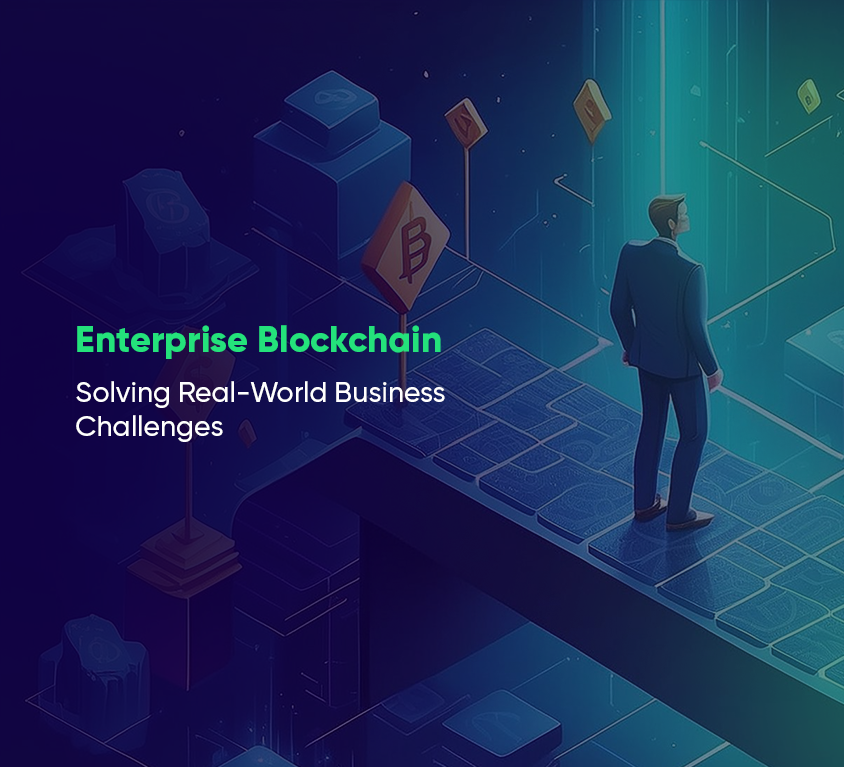
Introduction
Blockchain & Web3 Services Trusted By Leaders
- Develop innovative solutions using our state-of-the-art blockchain expertise.
- Achieve accelerated growth with robust & scalable Web3 consulting.
- Unlock 360-degree security with our top-rated blockchain development.
Enterprise Blockchain: Solving Real-World Business Challenges
Blockchain is revolutionizing industries like supply chain management by streamlining the tracking process and keeping records. Blockchain technology creates a secure and shared ledger that allows businesses to break down data in silos. These data silos encourage trust with partners and streamline operations. However, successful enterprise blockchain development is not without challenges.What is an Enterprise Blockchain?
Before learning what is an enterprise blockchain, you need to understand the basic concept and characteristics of blockchain technology; Traditional business processes have drawbacks like data silos, a lack of trust, and inefficiency. Blockchain helps keep track of chronologically ordered data that is publically accessible which protects consumers’ privacy and prevents data manipulation. However, the rise of blockchain startups in corporate sectors is a major cause of scalability issues. However, custom blockchain development companies made Enterprise Blockchain that comes as a promising option for businesses. It is a specific type that is designed for specific businesses and objectives. It allows for limited data management to specific individuals or groups, allowing for better control over the network. Blockchain for business is better suited to meet the needs of enterprises, as it allows for easy addition or removal of users, imposes conditions and restrictions, and makes the network immutable.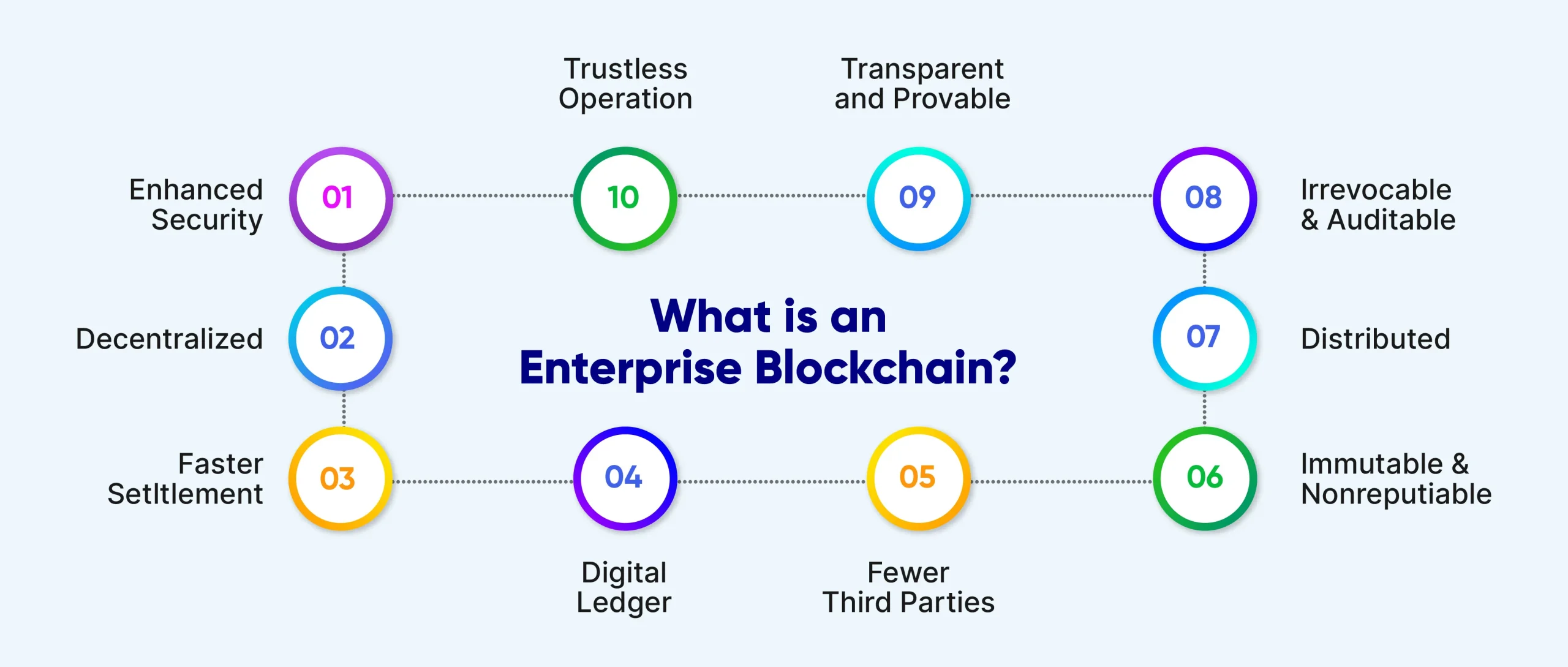
Blockchain Adoption Rate in Enterprises
Enterprises know how blockchain can benefit them and that is the main reason for Blockchain’s popularity. It helps in improving supply chain operations and increasing blockchain cybersecurity. Furthermore, a report by Statista, the global blockchain technology market is expected to reach a valuation of $163 billion by 2027, driven by the growing understanding of its potential in various industries.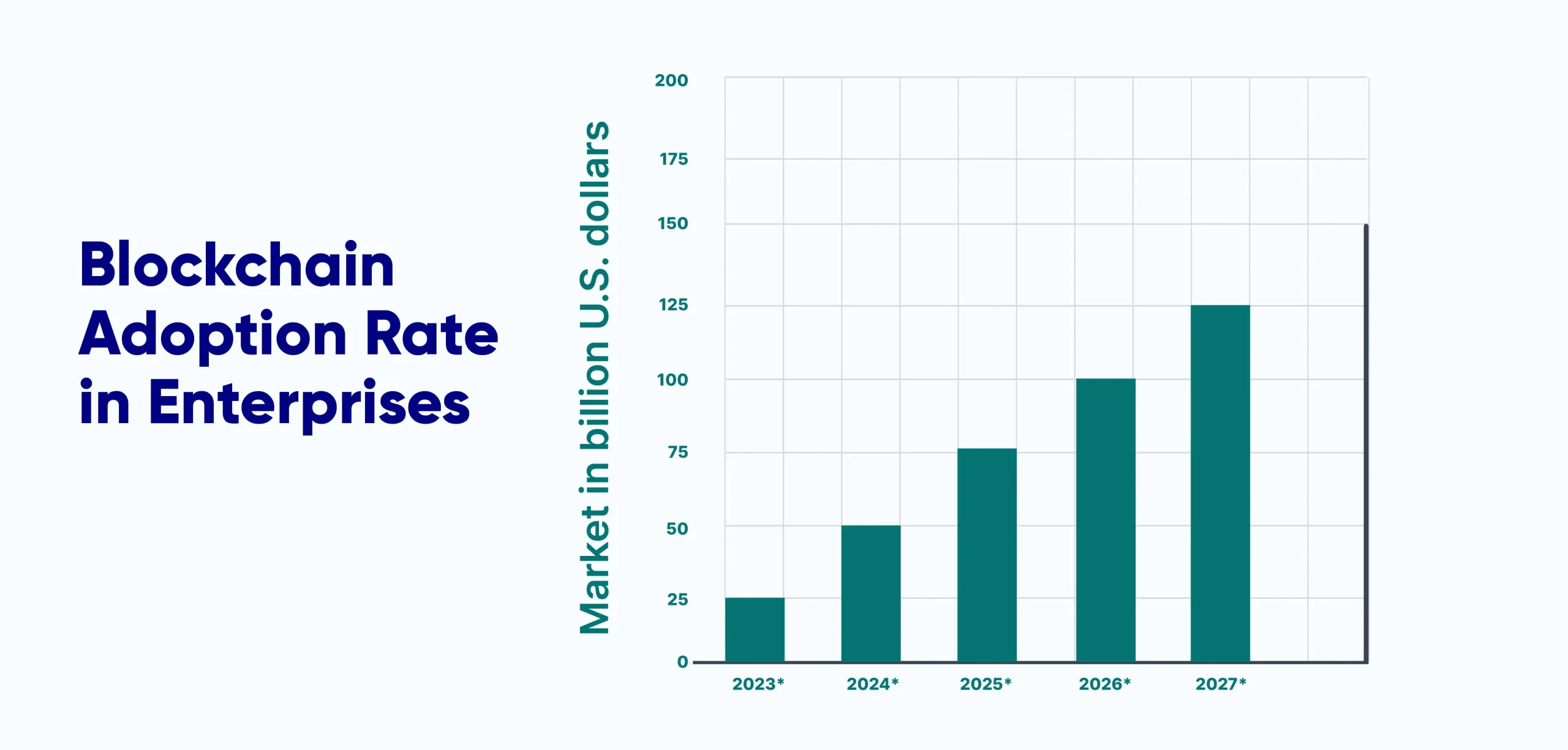 Experts said that blockchain’s global adoption is just because of its ability to improve security, transparency, and efficiency. The market demands tamper-resistant and decentralized systems and ongoing improvements in blockchain applications.
Experts said that blockchain’s global adoption is just because of its ability to improve security, transparency, and efficiency. The market demands tamper-resistant and decentralized systems and ongoing improvements in blockchain applications.
5 Key Features of Enterprise Blockchain
Blockchain can transform every industry and its diverse features fill gaps in the enterprise ecosystem. Here are the top 5 features of enterprise blockchains that set them apart from public blockchains, making them a valuable tool for businesses.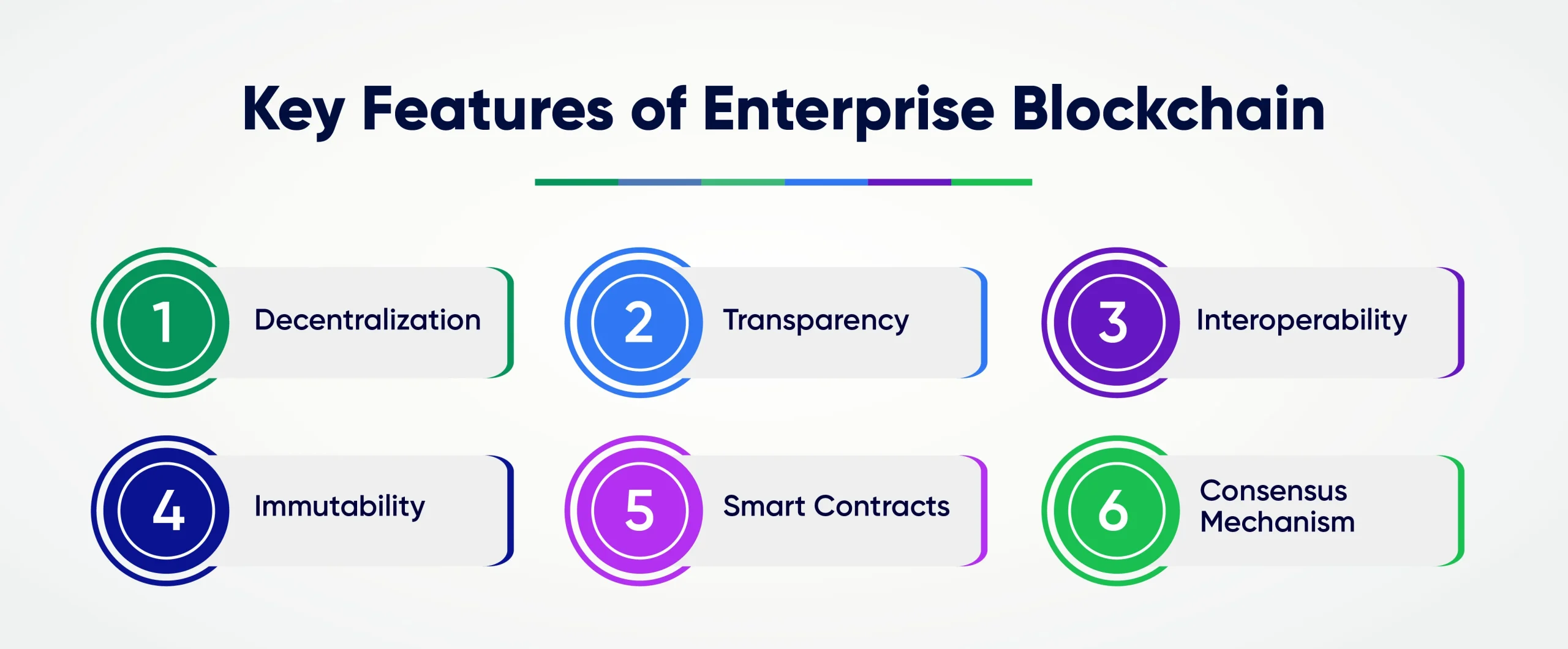
- Decentralization: Blockchain is decentralized which creates a system where everything doesn’t rely on a single entity. It lets you create tamper-proof communication networks and compliance systems, making them virtually unhackable. Enterprise blockchain works as a super secure and transparent solution that is accessible to everyone.
- Immutability: Once you enter a blockchain, you have no way out, it’s there forever. No take-backs! Sounds scary? But not for businesses as blockchain works as a game-changer for quality control. When everyone knows information is locked in, there’s a much higher chance of getting things right the first time. No more endless back-and-forth, just accurate data, and guaranteed quality.
- Transparency: Blockchain is open and transparent opens a new level of responsibility within your organization. Everyone can see everything, making employees and stakeholders think twice before acting unethically. Furthermore, this transparency builds trust with partners and clients. Thus, they can verify every transaction in real time, fostering a sense of shared responsibility.
- Smart Contracts: A self-executing agreement that runs by itself after some conditions are met is a smart contract! These automated contracts based on blockchain save businesses time and money by eliminating the need for middlemen and streamlining processes. Additionally, they reduce errors and disputes, making everything faster and more accurate.
- Interoperability: Different systems can talk to each other with blockchain’s interoperability feature! Interoperability lets organizations collaborate, share information, and communicate seamlessly. It’s like breaking down walls between different departments, creating a more connected and efficient digital ecosystem.
- Consensus Mechanisms: The blockchain consensus mechanism ensures all participants have the same, reliable record of transactions. As a result, it prevents fraud and keeps the entire system secure and trustworthy. Different consensus mechanisms exist, kind of like having different voting systems, each with its strengths.
Applications of Blockchain
These are a few examples of how blockchain is reshaping industries with innovative applications for use cases to emerge across various sectors. Here’s a glimpse into how different industries are using blockchain to solve key challenges:Finance
Traditional financial systems offer slow and expensive cross-border payments. However, blockchain streamlines international transactions and reduces processing times and fees.- JPMorgan Chase’s Quorum: Streamlines cross-border payments by creating a secure and transparent network for international transactions.
Insurance
Conventional systems are causing fraudulent claims and slow processing times. The solution to this is smart contracts that automate claim settlements, reducing fraud and expediting payouts.- Allianz: Automates claim settlements with smart contracts, reducing fraud and expediting payouts in the insurance industry.
Education
The education industry has faced difficulty verifying the authenticity of diplomas and certificates for a long time. Now, Blockchain works as a sustainable solution by creating a secure and tamper-proof record of academic credentials. MIT Blockchain: Creates a secure and tamper-proof record of academic credentials, streamlining verification processes for employers and educational institutions.Automobile
The automobile industry’s major drawback is the lack of transparency in supply chains and vehicle history tracking. By integrating blockchain into systems can enable tracking of parts, ensuring authenticity and streamlining vehicle history management.- BMW (MOBI): Enables tracking of car parts and vehicle history, ensuring authenticity and improving maintenance processes in the automotive industry.
Supply Chain & Logistics
Product tracking and delivery is a concerning process as there is inefficiency and lack of visibility. Blockchain in supply chain can enable real-time tracking of goods, optimizing delivery routes, and reducing errors.- Walmart (pork tracking): Ensures the origin and movement of pork can be tracked throughout the supply chain, promoting food safety and consumer trust. Alibaba: Uses blockchain to track product authenticity, reducing counterfeit goods entering the system and building trust with customers. FedEx (BiTA participation): Improves supply chain visibility by providing real-time tracking of goods, optimizing delivery routes, and reducing errors.
Healthcare
Securely sharing and managing sensitive patient data with traditional systems is a major problem in the healthcare industry. Blockchain offers a secure and tamper-proof system for storing and managing Electronic Health Records (EHRs).- Pfizer: Using blockchain for supply chain transparency and aims to enhance traceability, transparency, and efficiency in its operations.
Media & Entertainment
Ensuring a fair distribution of royalties and managing content rights is a major concern in the media industry. However, blockchain automates royalty payments and facilitates new business models for content distribution. For Example;- Comcast: Optimizes media supply chain by leveraging blockchain for content distribution and digital rights management, potentially reducing operational costs.
What Makes a Good Enterprise Blockchain?
A good blockchain enterprise solution focuses on privacy, security, throughput time, and operational costs. Here we listed some key differences between public and enterprise blockchains to clarify why enterprise blockchain is better than public ones;- The data privacy and security of blockchain systems differ significantly between public and enterprise setups. Public blockchains allow data to be viewed by anyone, while enterprise setups restrict access to authorized stakeholders through permissioned viewing.
- Enterprise blockchains require additional security features like Know Your Customer or Anti Money Laundering, which are optional in public systems.
- Transaction volumes on blockchain systems also differ, with public blockchains generally having greater scalability, while enterprise blockchains require developers to maintain low throughput times.
- Operational cost is also crucial for businesses, and blockchain enterprise applications should operate on cost-effective platforms with stable transaction fees.
Top Blockchain Platforms for Enterprise
Blockchain is not just a hype now but it is transforming how businesses operate. With the technological advancements, the increase in different blockchain platforms came into being. Some of the blockchain platforms are listed below;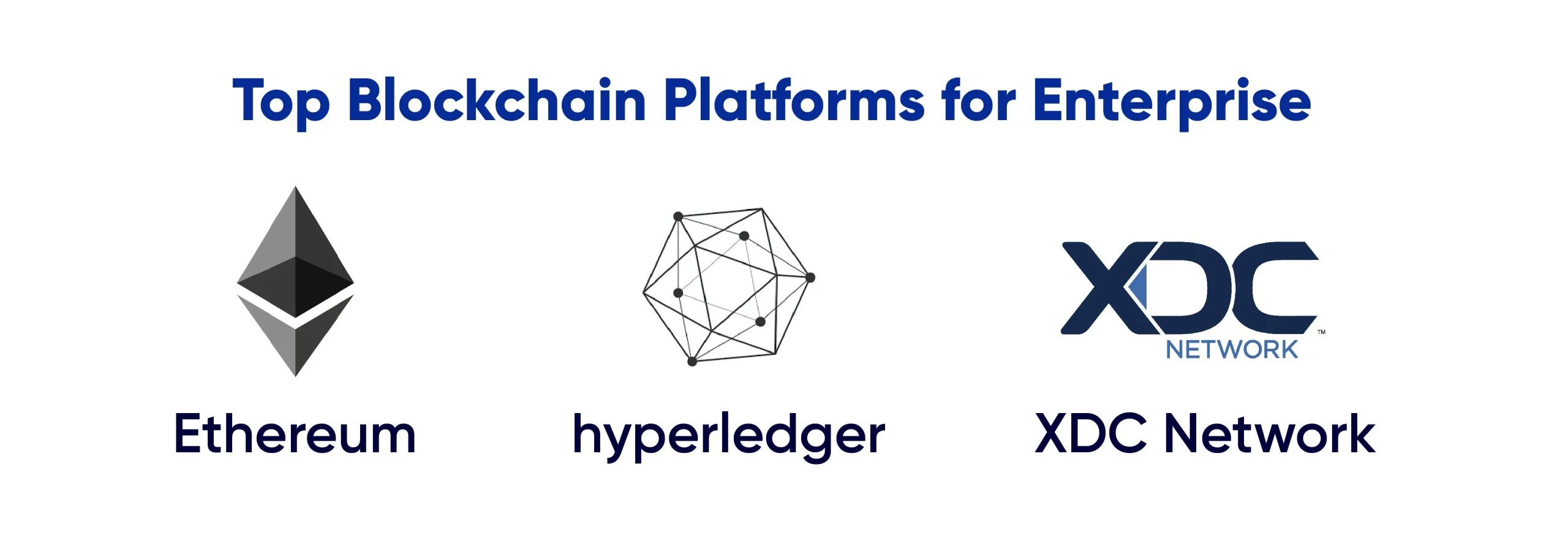
- Ethereum is a base component for decentralized applications, offering strong security, stable performance, no downtime, and effective fraud prevention.
- Hyperledger Fabric is a permissioned network designed for businesses, requiring user registration and specific permissions.
- XDC Network is an enterprise-grade hybrid blockchain for finance and global trading, combining private and public blockchain features.
Do you Need a Blockchain?
Blockchain gained popularity across various industries, but it is important to understand its true value proposition before investing. Blockchain plays a great role in solving specific challenges for businesses, such as reducing middlemen, ensuring data integrity, and speeding up transactions. Its decentralized nature eliminates the need for intermediaries, streamlining processes and saving money.- It may not be the most cost-effective solution for large amounts of non-transactional data.
- It may not be ideal for businesses relying heavily on a trusted central authority, as its decentralized nature may not be ideal.
- Additionally, if all network participants require write access, a private/permissioned blockchain might be a better fit than a public one.